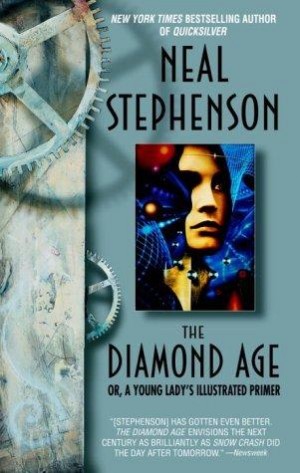Kid-Lit Cares: Superstorm Sandy Relief Effort:
What is KidLit Cares?
It’s an online talent auction to benefit the Red Cross relief effort for Sandy. Agents, editors, authors, and illustrators have donated various services to be auctioned off to the highest bidder, with donations being made directly to the Red Cross disaster relief fund.
What kinds of things are included?
Manuscript critiques, in-person and Skype author visits, virtual writing workshops, school & library marketing consultations for authors… you name it.
See also: Six Ways for Geeks to Help with Hurricane Sandy Relief at GeekMom.
November 2, 2012 @ 5:23 pm | Filed under:
Books,
Links We may not be living in the Diamond Age quite yet, but Neal Stephenson’s Primer is here. My friend Andy Diggle (who’s the reason I read The Diamond Age in the first place) sent me this link about a learn-as-you-go software project influenced by (and named in honor of) The Young Lady’s Illustrated Primer, that amazing smart-book device from Stephenson’s nanotech masterwork:
“We left the boxes in the village. Closed. Taped shut. No instruction, no human being. I thought, the kids will play with the boxes! Within four minutes, one kid not only opened the box, but found the on/off switch. He’d never seen an on/off switch. He powered it up. Within five days, they were using 47 apps per child per day. Within two weeks, they were singing ABC songs [in English] in the village. And within five months, they had hacked Android. Some idiot in our organization or in the Media Lab had disabled the camera! And they figured out it had a camera, and they hacked Android.”
“OLPC” stands for One Laptop Per Child:
The One Laptop Per Child project started as a way of delivering technology and resources to schools in countries with little or no education infrastructure, using inexpensive computers to improve traditional curricula. What the OLPC Project has realized over the last five or six years, though, is that teaching kids stuff is really not that valuable. Yes, knowing all your state capitols how to spell “neighborhood” properly and whatnot isn’t a bad thing, but memorizing facts and procedures isn’t going to inspire kids to go out and learn by teaching themselves, which is the key to a good education. Instead, OLPC is trying to figure out a way to teach kids to learn, which is what this experiment is all about.
OLPC created special learning software for the tablets in this project, specifically modeled on the Primer.

If this all reminds you of a certain science fiction book by a certain well-known author, it’s not a coincidence: Nell’s Primer in Neal Stephenson’s The Diamond Age was a direct inspiration for much of the OLPC teaching software, which itself is named Nell. Here’s an example of how Nell uses an evolving, personalized narrative to help kids learn to learn without beating them over the head with standardized lessons and traditional teaching methods…
**********
An excerpt from my 2010 booknotes on The Diamond Age:
Neo-Victorians, nanotech, and education: this novel had me at hello. Top-notch world-building; there’s a little dose of cyberpunk in the opening, with a ruffian named Bud getting himself fitted up with a skull gun that fires explosive bullets upon his mental command; and then we’re whisked off to New Atlantis/Shanghai, the home base of a thriving Neo-Victorian community, where the upper crust are Equity Lords (aristocrats by dint of their corporate ties) and the birthday entertainments involve creating fairylands that rise out of the sea for a day, thanks to the limitless possibilities of molecular manipulation. There is something delightful about this melding of Dickensian characters and futuristic tech.
One of the upper-crustiest of the Equity Lords is an elderly gent who, for all he esteems his phyle and works to protect and promote it, rues the loss of opportunity for young Neo-Victorians to experience character-building adversity. His adult children missed out on something important, he believes—after all, he himself grew up on an Idaho farm, was homeschooled until age fourteen, pulled himself up by his bootstraps and all that. He determines to offer his granddaughter an alternative to the soft Vicky upbringing, in which status and comforts are often taken for granted by those born and raised in the phyle. To this end, he hires a gifted techno-engineer, one John Hackworth, to create a sophisticated, interactive book-slash-computer, the Primer, which will provide his granddaughter with personalized instruction in academic subjects, ethics and morals, handcrafts, self-defense, computer programming—pretty much everything under the sun.
Hackworth rises to the challenge…Hackworth, who, as it happens, has a young daughter of his own. He attempts to procure a bootleg copy for four-year-old Fiona, and therein lies the tale. The illicit copy of the Primer goes astray and winds up in the hands of a young thete child—thetes belong to no phyle at all—named Nell. As in “little Nell”—a Dickensian waif full of pluck, growing up in dreadful circumstances in a cold, cruel world. If ever a child needed a Magic Book, it’s Nell. Well, and Pip, and David Copperfield, and Oliver Twist…but no, really, Nell’s in worse straits than all those lads (her mother, Tequila, has worse taste in men than David Copperfield’s mum), and we’re thrilled to see the Primer offer her some tools for digging her way out of the squalor.

